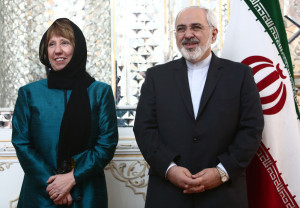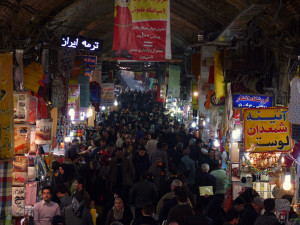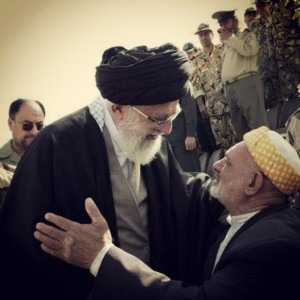Iranian Supreme Leader Ayatollah Khamenei is a master at manipulating and appeasing political factions in the country. The Iranian citizen is nothing more than a pawn in this complex game of chess.
Supreme Leader Ayatollah Khamenei is playing a cynical double game: backing President Rouhani’s nuclear negotiations to lift international sanctions while backing the conservative right and arguing for autarky and an “economic Jihad” that would eliminate dependency on the outside · Between the hollow phrases of self-sufficiency and the economic domination of Iran by Khamenei and his subordinates, the Iranian public remains unimpressed · It’s politics as usual in the Byzantine labyrinth that is the Iranian government

Life isn’t easy in Iran right now: the Ahmadinejad government’s disastrous mishandling of the economy and the heavy burden of international sanctions are making life increasingly difficult for the population, making removing the latter especially important for both the regime and the average citizens. But in spite of a recent very partial lifting of the sanctions, their full removal depends on negotiations – which as EU Foreign Minister Catherine Ashton stated are far from over.
It is against this background that Khamenei announced a “resistance economy” plan on February 19. The plan contains numerous articles laying out the appropriate goals of the Iranian economy such as: increasing oil and gas production to influence the world economy, encouraging investment, focusing on exports rather than imports and creating a culture of “Jihad, which creates values and wealth and increases effectiveness.” According to the Supreme Leader, these principles are meant to extract Iran from its current economic dead end and make it “independent, flexible and knowledge-based.”
Iranian media outlets have publicized the plan and Khamenei has personally instructed all relevant heads of government branches – executive, legislative and judicial – to adopt it. On the regime’s instructions, Iranian clerics have also begun to spread the word, repeating slogans of “resistance economy” in the Mosques in order to encourage the public. For instance, Tehran Friday Preacher Ahmed Khatami declared that “the infrastructure has accumulated for 35 years. We are number one in oil and gas production and are capable of implementing a resistance economy. This economy will cancel out the effect of the sanctions.”
Pessimistic Citizens and Empty Phrases
At first glance, Khameini’s plan sounds excellent: after all, who can object to an efficient economy, based on knowledge and exports, which grants economic independence? But the devil is in the details, and even a casual glance at the “resistance economy” platform would show no specifics on how to achieve such lofty goals.
The Iranian public is perfectly aware of this; broad sections of the Iranian public have figured out that the plan is nothing more than a collection of slogans with no foreseeable impact. Iranian lack of enthusiasm for Khamenei’s grandiose scheme can be seen in the prominent lack of discussion of the plan on the Iranian Internet – outside of official government blogs and websites, of course.
An Iranian friend of mine made similar observations: “These terms – ‘resistance economy’ – are word games,” he explained to ‘Mida’. “The overwhelming majority of the Iranian people are interested in opening the gates of trade to the world. Even the extremists understand this.” According to him, the nuclear talks are a hopeful opening for a country suffering under the economic burden, and “right now, there is appositive atmosphere among the Iranian people about the future.” “But if the talks reach a dead end,” he warned, “Iran will spiral out of control.”
Indeed, the only hope for both the regime and the citizens is the removal of the sanctions, which will open Iran up to free trade with the rest of the world. It’s not for nothing that Iranian media outlets incessantly report on western companies lining up to do business with Iran. Considering the enormous potential of the Iranian market, this is no empty propaganda. But despite all this, the way things look now, it will be a long time before foreign companies sign on the dotted line.
For instance, in the wake of the sanctions on Iranian banks, these last were disconnected from the SWIFT system for inter-bank transfer, which of course hinders money transfers between Iran and the rest of the world, with all that entails. It’s true that sanctions don’t limit the purchase of foodstuffs and other products defined as “humanitarian needs,” but even they are made more difficult to acquire due to the sanctions. Iran is trying to ease such bureaucratic processes, but meantime, according to a recent Reuters report, Western banks are not cooperative due to their fear of American penalties.

A History of Corruption
Iran’s economic problems didn’t start with sanctions; they derive from a number of reasons, some of which precede the 1979 Islamic revolution. These problems are inefficiency, maladministration and above all – endemic corruption. We’re not talking here of “normal” individual corruption, but rather institutional corruption, which has roots in the 1970s in the days of Mohammad Reza Shah. Iran expert Charles Kunzman stated that “corruption was not just a side issue in Pahlavi Iran. It was a cornerstone of the Iranian economy. The state was involved in the tiniest of corners of the Iranian economy in spite of the Shah’s hatred of communism and his belief in a free market.”
The Islamist regime did not invent this corruption, but it inflated it to new heights (or lows). Today Iran has an extensive shadow market, run partially by the ‘Revolutionary Guards’ who control companies, factories and ports. We should note that the guards are bound to their Leader alone, and not to any President.
Reuters’ in-depth investigation sheds new light on Ali Khamenei’s corrupt economic empire. Khamenei is at the head of the pyramid of the “Setad” organization, an enormous real-estate company, and at the head of “Bonyads”, equity funds which manage billions of dollars. According to the American Treasury Department’s calculations, “Setad” alone is valued at 92 billion dollars. Khamenei may not be personally corrupt – at least there’s no hard evidence of this – but all this wealth is nevertheless at his disposal.
Obviously the Revolutionary Guards and affiliated institutions aren’t going to stand aside and give up their slice of the pie for the sake of the state. Any company doing business with Iran will likely have to earmark some of its budget to bribe clerks and “share the wealth” with a variety of other bodies, similarly to what’s happening in Russia nowadays. It’s not for nothing that Iran is an unenviable 144th place on the Global Corruption Index, not far from Russia at 127th place. The trouble is that like Egypt, there are no methods or systems that will jumpstart the Iranian economy at a rate satisfactory to its citizens.
True Concern for the Citizen or Political Manoeuvring?
To a certain extent, Khamenei’s “resistance economy” is a sign of his pessimism about the outcome of negotiations with the Western powers, thus pushing him towards the country’s conservative right.
In the past, the Leader didn’t appear to object to negotiations per se, thus backing up President Rouhani. On the other hand, whenever the conservative right claimed that “Khamenei objects to the negotiations,” he never issued a denial. This is significant: Khamenei’s office is very sensitive to any quote attributed to him. He also declared that he doesn’t think the negotiations will bring positive results for Iran – in other words, removal of sanctions – and therefore Iran should start relying on itself and “tighten its belts.” This position, along with the empty slogans such as “economic Jihad” and overcoming sanctions which Khamenei repeated in his speech, are just what the conservative right wants to hear. This goes against President Rouhani who supports economic openness.
Thus does Khameini, who controls all factions in the country, play a double game: he allows Rouhani to proceed with negotiations while also supporting the conservative right which opposes them. It’s a classic political maneuver: if the negotiations succeed then he gains, and if not – and the economy doesn’t improve – then he said all along the Americans can’t be trusted and it’s now time for “economic Jihad.”

A Hamstrung President
Judging by his critical remarks towards the Revolutionary Guards, Rouhani understands that he will not able to carry out his planned reforms without clashing with their vested interests. Therefore, his dependence on Khamenei increases, since only the latter can give the Guards orders. This is apparently the background to the “status quo agreement” between them: according to reports, the two met and agreed that Rouhani will receive backing on the nuclear negotiations on condition he avoids interfering in matters concerning civil rights and liberties.
This is why executions in Iran go on as usual. The UN Human Rights representative in Iran reported that the human rights situation under Rouhani has not really improved. Rouhani’s deafening silence on these matters is therefore perfectly understandable, confirming the existence of the status quo agreement between the President and the Supreme Leader. It’s all part of the complex game of political chess played in Iran.
English translation by Avi Woolf.
To receive updates on new articles in English, join Mida on Facebook or Twitter or join our mailing list.



